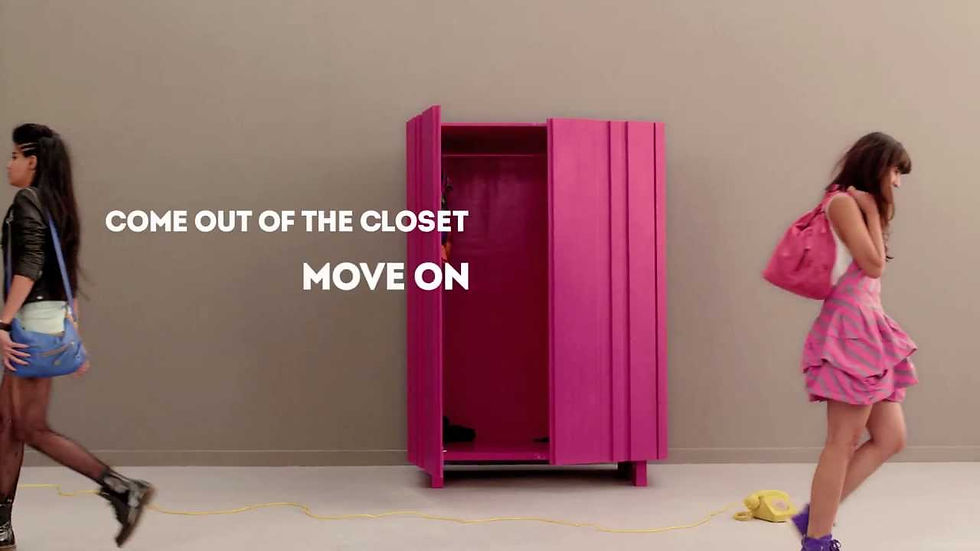Queer Capitalism
- LGBTQ Plus India
- Oct 20, 2021
- 3 min read
Updated: Feb 11, 2022
Kaashvi Sheoran
In support of the Supreme Court’s judgement legalizing same-sex relationships in 2018, there has been an upsurge in the sale of LGBTQ+ merchandise. The rise in Pride merchandise is often regarded as a celebration of the verdict and representation and betterment of the LGBTQ+ community and their rights. Several companies have been on board with this trend, whether rainbow-painted cabs or clothes with pride flag designs. But why hasn’t anybody questioned why it wasn’t happening before the ruling? Why did the LGBTQ+ community receive no support before 2018? The answer to these questions is Queer Capitalism.

Queer capitalism, also known as Rainbow Capitalism or Pink Capitalism, is a modern trend in increasingly capitalist India. But what does it mean? The integration and inclusion of the LGBTQ+ movement into capitalism and the economy are known as queer capitalism. It is the practice of pink-washing items to gain support and attention to improve sales and market. Pink-washing, in simple words, is the use of the rainbow colours to show support for the community but has the fundamental goal of gaining more profit. Many brands boast about their acceptance and improvement of the queer community yet do not hire transgender people. Most of these “supportive” brands and corporations are actively engaged in homophobic practices - such as discrimination against queer employees, funding and sponsoring countries, politicians and organizations that are homophobic. This reveals the true extent of the support of these brands, which is only limited to their sales and profits.

This entire notion of queer capitalism is a farce since it exploits the LGBTQ+ community for profit and develops an image for itself in which the brand or corporation is viewed as supportive of the community when in actuality, it is using this image for its own earnings. A fitting example to my above statement would be Adidas. One of the most well-known businesses that display its support for the LGBTQ community by dedicating an entire section to pride merchandise, but is it truly genuine? Adidas was a primary sponsor of the World Cup, which took place in Russia, a homophobic country with anti-LGBTQ+ legislation. Their sponsorship for the country contradicts their pro-LGBT image, making the whole affair nothing more than a marketing ploy to profit from increased sales. Pink capitalism and the message it conveys are a hoax and a marketing strategy based on customer policies and sentiments and using them to boost sales.

The Fast Track commercial shows two women coming out from the closet. Yet, it implies a masculine and feminine position/role in a relationship, which is demonstrated in this advertisement by the clothes worn by both women. The gender role in the ad is determined by the colour of the garments, which is ridiculous in itself, but also since it normalizes the notion of a binary relationship. It also promotes the harmful stereotype that lesbian/queer women have to be either masc or femme. Similarly, numerous organizations and platforms encourage the queer community to recognize just two binary genders, discrediting the community again.

Queer capitalism is most prominently observed during Pride Month when brands start flashing rainbows flags on the first day of June but discard them on the last day of the month. Do the support and acceptance last only as long as the month does? The slogan “Queer liberation, not Rainbow Capitalism” accurately captures this phenomenon. Purchasing and owning rainbow merchandise and goods is a way to express one’s identity; however, brands and companies take advantage of this fact knowing that the sales will increase significantly.
During Pride Month, businesses exploit the LGBT+ community to enhance their marketing and consumer base by producing rainbow mugs and printing rainbow phone cases and clothing, among other things. The growth of Pink Money in India has increased from 0.4 to 1.6 per cent of GDP - evidence of queer capitalism. The use of propaganda has been visible through various forms over the last few years, which has led to an increase in queer capitalism.

Queer capitalism targets a market of individuals who are led to believe that by purchasing certain items from such businesses, they are demonstrating their support for the LGBTQ+ Community. The profits of these businesses rise as their sales increase while exploiting the queer community by supporting them just as long as the spotlight stays on them. Rather than becoming part of the queer capitalist technique, one may support the community by participating in pride parades, promoting and buying from a queer-owned business, such as Equal Friend, Wildfang, Otherwild, among others. It is time we understand and educate ourselves about pink-washing and take steps to address and counter queer capitalism.
Some Indian queer-owned bsuinesses:
The Madeleine Store (https://www.instagram.com/themadeleinestore/?utm_source=ig_embed&ig_rid=fcef6675-dc75-4d3b-baf8-3f57f4ba45d2)
Eclaypse (https://www.instagram.com/eclaypse/)
Mellillabysar (https://www.instagram.com/mellillabysar/?utm_source=ig_embed&ig_rid=ff31babb-1830-4d2d-b6b4-7987a4684acd)
Merchbykris (https://www.instagram.com/merchbykris/)
Artwalahoe (https://www.instagram.com/artwalahoe/)

Bibliography:
https://gaysifamily.com/2019/06/26/is-rainbow-capitalism-truly-queer-liberation/
https://www.vox.com/2018/6/25/17476850/pride-month-lgbtq-corporate-explained
https://www.sociologygroup.com/impacts-rainbow-capitalism-queer-movement/
https://www.shethepeople.tv/home-top-video/pink-capitalism-harms-lgbt-community/
https://feminisminindia.com/2018/10/16/indian-brands-pinkwashing/
https://medium.com/radhika-radhakrishnan/brands-are-not-your-friends-6c69d11df2c7
https://feminisminindia.com/2021/03/12/rainbow-capitalism-lgbtq-movement-appropriation-capitalism/
https://www.buzzfeed.com/aqibspeaks/queer-owned-small-businesses-in-india




Omg so true! And even the pink merchandise is so basic at times ugh.